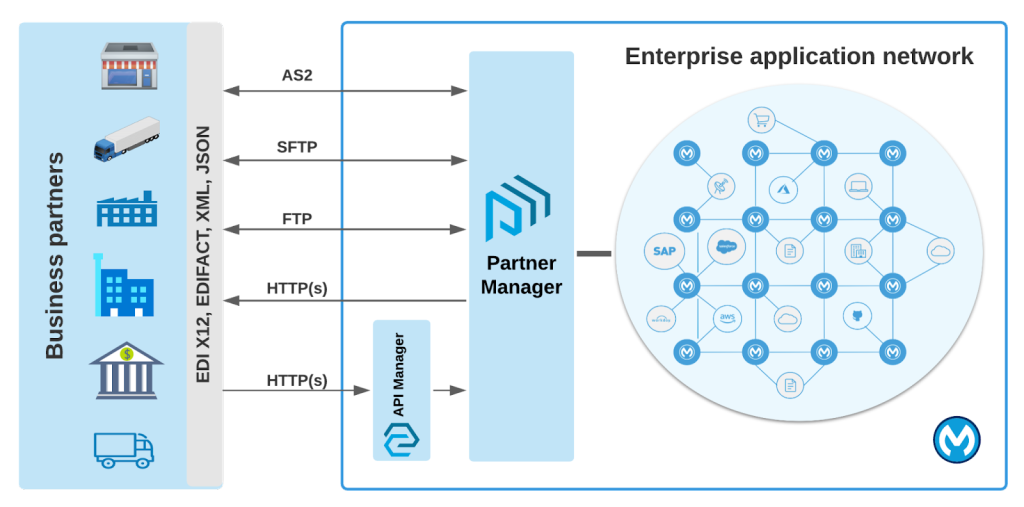I’m excited to announce that MuleSoft Anypoint Partner Manager now supports business transactions exchanges between enterprises via APIs, in addition to standard EDI message formats such as X12 and EDIFACT. Partner Manager extends the power of application networks with external partners, through a simplified and consistent experience – across both EDIs and APIs.
The need to modernize B2B integrations
Organizations across all industries are going through large-scale digital transformations, moving their core enterprise business processes to cloud-based SaaS applications. Modern iPaaS platforms such as the MuleSoft Anypoint Platform are powering the way their internal systems, data, and resources integrate through an API-led connectivity approach.
A critical component that has gone unchanged is how organizations integrate with their external business partners to exchange critical business transactions like orders, shipment statuses, and invoices. Electronic Data Interchange (EDI) standards such as ANSI ASC X12 and UN/EDIFACT continue to play a vital role in automating the exchange of such transactions between enterprises.
EDI, API, or both?
Even as online B2B commerce channels continue to emerge and offer enhanced buyer experiences, EDI still accounts for over 78% of B2B digital sales, according to the 2020 B2B eCommerce Market Report. EDI messaging plays a critical role in driving unparalleled operational efficiencies in different industries, specifically across functions within supply chain management.
While EDI continues to dominate, we also see many organizations, especially newer start-ups, that have not invested in legacy EDI software. Many of these organizations are looking for other ways to exchange business transactions with their partners in real-time and look to APIs as a potential alternative.
Standardization or the lack of it
When adopting APIs as the primary means of communication with business partners, organizations often lack universally accepted specifications for common business transactions.
EDI standards such as ASC X12 and UN/EDIFACT solve this challenge with detailed definitions and structure of business transactions across different industries. These standards have widespread adoption across geographies and drive greater levels of efficiency. This widespread adoption reduces the need to deal with complex 1-to-1 mapping between an organization’s internal message formats and the message formats of their hundreds or thousands of trading partners.
Coexistence of EDI and APIs
Despite the lack of standardization, using APIs for B2B data exchange continues to be an emerging trend as organizations increasingly look for more real-time data integrations with their supply chain partners.
In some cases, we also see the same organization adopting EDI to exchange certain message types (such as load tenders and invoices in the transportation industry), and APIs for other message types (such as shipment statuses for real-time freight tracking). This results in a mixed-use of EDIs and APIs within the same value chain.
That said, organizations are at an intersection where they need to support both traditional EDI and modern API channels as part of their B2B digital strategy to grow and scale their business. MuleSoft’s API-led connectivity approach enables that hybrid.
Selecting the right B2B integration solution
When choosing the technology platform for your B2B integrations, you need to consider several aspects to set your organization for the future.
Speed and agility
- Organizations no longer want to patiently wait for weeks and months before kick-starting their business relationships.
- The longer it takes for your organization to onboard your business partner into your ecosystem, the higher the chance of losing business to one of your competitors.
- Whether you’re onboarding your partner via EDI or API, the technical onboarding should only take hours or days, not weeks or months.
- It’s critical to empower your lines of business (LoBs) with the ability to own partner onboarding and operationalize partner relations quickly to remove the dependency on the already overburdened IT organization.
Unified integration platform
- The integration platform should support both EDIs and APIs, offering consistent partner management and transaction visibility.
- Running one platform for EDI and one for APIs has the following disadvantages:
- Disjointed experience through the entire lifecycle from onboarding to operational support.
- Increased total cost of ownership as you need to hire technical resources with two different skill sets and manage relationships with two different software vendors.
- Inability to get end-to-end visibility of your business transactions between systems offering limited options to drive better business and operational insights.
Partner and internal system connectivity
- The enterprise technology landscape is constantly changing every passing day, with the advent of modern software applications and data sources.
- Your selected integration platform should offer breadth and depth of connectivity options to integrate with both your external business partners and internal systems seamlessly.
- The platform should enable your organization to exchange business transactions between your internal systems and your partners in real-time, end-to-end, therefore cutting down latencies.
- Not every B2B transaction interfaces with the enterprise resource planning system (ERP). A typical enterprise has different internal systems beyond the ERP, including a CRM, an external billing system, transportation management, warehouse management, and more that need to integrate with external partners via standard B2B communication.
End-to-end visibility and traceability
- B2B integrations play a vital role in keeping an organizations’ supply chain moving. Any disruption in these integrations could result in a larger impact on the business.
- COVID-19 has made many organizations realize how important it is to have deeper visibility and insights into the B2B transactions and partner connectivity to make their supply chain resilient to changing environmental dynamics. This shift pushes organizations that have historically outsourced B2B integration functions to bring B2B integrations back in-house to have deeper visibility and control.
MuleSoft Anypoint Partner Manager
MuleSoft Anypoint Partner Manager enables LoB developers to quickly and easily integrate with external business partners through both traditional EDI as well as modern APIs via a simplified low-code experience.

Partner Manager enables your organization to transform how it integrates with your trading partner ecosystem in the following ways:
- Democratizes B2B integrations to your LoBs: With underlying technical and infrastructure complexities abstracted, and a low-code, configuration-driven partner onboarding experience, your LoBs can own the full lifecycle of your partner integrations without relying on your central IT team.
- Supports API-based B2B exchange and traditional B2B standards and protocols. With support for message formats like EDI X12, EDIFACT, XML, and JSON as well as transport protocols like AS2, SFTP, FTP, and HTTP(s), Partner Manager offers extensive coverage to handle most B2B integration requirements. You can also manage Partner Manager endpoints with Anypoint API Manager, taking advantage of the best-in-class API governance capabilities to secure and scale your B2B transactions.
- Drives better business and operational insights: Partner Manager makes B2B integrations a natural extension of your application network powered by API-led connectivity approach. It enables seamless integration with your internal systems allowing for end-to-end visibility and traceability of transactions across systems.
Getting started with Anypoint Partner Manager
Get started on configuring and operationalizing B2B integrations with your partners with these Partner Manager Message Flows.
You can also sign up with Anypoint Platform for free and contact your account representative to try Anypoint Partner Manager.









